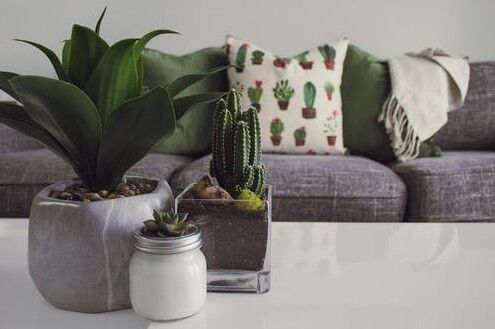Giving someone a houseplant is a lovely gesture. Since real plants give the owner a lot of benefits, gifting one shows that you really care. Houseplants improve the air quality in a home, improve its aesthetics, and have several other advantages to recommend them. However, plants of any kind are also a responsibility with possible downsides. In order to make sure that you’re giving a gift and not a liability, consider certain factors before making your final decision. The guide below should help you with the thought process:
Your Aim
Take a look at the reasons why you want to give a plant in the first place. Let’s be honest; a plant isn’t the easiest gift around. You can’t transport it as easily as other items; it probably can’t be gift-wrapped; plus, carrying and transporting it might create a mess from the scattered soil.
On the other hand, you might want to give the person a houseplant because you feel they’d need it. Some may consider a houseplant an excellent house-warming gift. If this is the case, make sure that there’s room enough for the size of plant you have in mind.
If you think the recipient of the gift needs something to decorate their home, the safest choice is usually a selection of succulents. These can come in many sizes, but the tiny ones in colorful pots will probably be the most versatile option. They can go on a study desk, brighten up a bedroom, or finish the look of a brand-new kitchen. Be sure to check out options to buy succulents online.
Many people also like to give small houseplants to a person who’s sick or bedridden. If this is the case, consider whether such a gift will be useful to them. If they’re in the hospital, they might not be allowed to have such gifts. On the other hand, a houseplant will cleanse the air and perhaps aid their healing process.
The Ability of the Receiver
Even if you think a plant will benefit a person’s home, the occupants themselves might not be suitable candidates to take care of it. Most houseplants may not require much care, but there are some basic needs to take care of. If the weather gets too dry, for instance, will the homeowner know or care enough to increase the humidity around the plant? The same goes for any sickness or disease that the plant might suffer from. The owner should be able and willing to take care of the houseplant’s health just as much as they would for their own kids and pets.
The ability of a plant owner might also be limited in ways they can’t control, such as allergies and work schedules. Make sure the person you give the plant to isn’t allergic to the nutrients in its soil, the leaves, the fruit, or the sap. You may also want to reconsider the plant if the recipient has a busy work week, only arriving at home after dark. This means that they probably won’t be able to move the plant in and out of the light when needed.
Kid and Pet Friendly
If the potential recipient of the house plant has kids and/or pets, this opens up a whole new Pandora’s box of potential issues. Adults are unlikely to chew at the leaves and flowers of houseplants; the same cannot be said of very young children and animals. If ingested, some plants can be very harmful for a tiny body. You don’t want to be the reason behind this, so it’s best to do your research beforehand. Some plants can be toxic, while others are relatively safe.
Potential Size
A houseplant might be perfect for decorating a bare balcony or an empty corner. However, it’s still a living thing that grows. Just how big can your gifted plant get before it’s too large for the intended space. If the homeowners don’t know how to prune and pinch back any excessive growth, the resulting size might be too large for comfort. The homeowner might appreciate a plant that’s just right for their vertical garden, but nothing bigger than that.
On the other hand, a tall plant might be just the thing a person needs. Many are now using large, oversized plants as statement pieces for their room, while others are grouping them together to form a private space for their home office. Again, see the needs of the person in question and gift accordingly.
The Surroundings
The plant you’re gifting would need a certain kind of environment, so make sure the requirements are fulfilled as much as possible. A cactus wouldn’t do well in a home with high humidity; similarly, a plant with colored foliage might need a lot of natural light to retain its unique appearance.
With all these factors being equally important, one might think that finding the perfect houseplant for gifting is nearly impossible. Fortunately, this isn’t the case. Below are just a few good examples of houseplants that are easy to take care of, look pretty, and make an impression:
Costa Farms Snake Plant Sansevieria Zeylanica
One of the safest houseplants to gift is the common snake plant, also known as the mother in law’s tongue. This is a hardy species, so it can even build up someone’s confidence in gardening and general plant care. It also comes from the sansevieria family, which releases oxygen all the time. The result is an instant improvement in the air quality for any home or office. Plus, the receipt wouldn’t have to constantly monitor them, which should be a plus for most people.
Costa Farms ZZ Plant
This is another suitable gift for a novice gardener or homeowner with a busy schedule. It only needs watering about once a month, so there’s no need to worry about travel schedule much. The ZZ plant is an African native, so it’s used to surviving both droughts and floods.
Aesthetically speaking, this is a softer, more rounded plant than other options. The leaves are loved and glossy, catering more to a cozy, classic style than a shape, modern one. Since they don’t require direct light, these are also excellent options for offices.
Pilea Peperomioides
This is also called a coin plant or Chinese money plant. With its flat leaves, this plant is a bit more demanding than the more common ZZ and snake plant species. One of the most fun parts of this option is the appearance of little shoots in its surrounding soil, which can be repotted for more gifts.
If the intended recipient of this plant is somewhat experienced and won’t mind transplanting the shoots, go ahead with this option. The shape is also quite unique and will surely enhance anyone’ home.
Bird’s-Nest Fern in Large Rosebaum Pot
Ferns require regular watering, though you have to be careful not to give them too much. While such plants are usually hardy, they do need a bit of care. This plant might be a suitable choice for someone with experience in gardening or taking care of plants in general.
The bird’s nest fern lies somewhere between the easiest and the most difficult fern species to take care of. If the recipient already has several plants, they probably won’t find it any trouble to add one more to their watering schedule. Plus, the pretty leaves of this fern will beautify and uplift almost any kind of home decor.
Dino Plant
This is a small but unique house plant that can serve as a conversation starter for many homes. It’s like a living fossil, as it can dry up and stay dormant for several years. When you do water it, however, it seems to come back to life.
Conclusion
The guide above should help you determine what kind of plant you should be giving to someone. Since plants are living things, we have a responsibility to the ones we give to other people as well as our own collection. Of course, you may end up deciding that a plant might not be a viable gift in certain situations. If you still want to give your loved one something to improve their home aesthetics, though, check out this guide to artificial plants.


